
In 1980, historian Howard Zinn published his classic work, A People’s History of the United States. The book would go on to sell over a million copies and change the way many look at history in America. We begin today’s special with highlights from a production of Howard Zinn’s Voices of a People’s History of the United States, where Zinn introduced dramatic readings from history. Alfre Woodard reads the words of labor activist Mother Jones; Howard’s son Jeff Zinn reads the words of IWW poet and organizer Arturo Giovannitti; Marisa Tomei reads the words of the women’s suffrage leader Harriet Hanson; and James Earl Jones reads from Zinn’s A People’s History of the United States.
Transcript
AMY GOODMAN: This is Democracy Now!, democracynow.org, The War and Peace Report. I’m Amy Goodman.
To mark Labor Day, we end today’s holiday special with highlights from a production of Howard Zinn’s Voices of a People’s History of the United States, dramatic readings from history selected by the late, great historian Howard Zinn. We’ll hear Alfre Woodard read the words of the labor activist Mother Jones; Howard’s son Jeff Zinn read the words of an IWW poet and organizer; Marisa Tomei reads the words of the women’s suffrage leader Harriet Hanson. But first, the late, great actor James Earl Jones reads from Howard Zinn’s People’s History of the United States.
HOWARD ZINN: [read by James Earl Jones] My viewpoint, in telling the history of the United States, is that we must not accept the memory of states as our own. Nations are not communities and never have been. The history of any country, presented as the history of a family, conceals a fierce conflict of interest. And in such a world of conflict, a world of victims and executioners, the job of thinking people, as Albert Camus suggested, is not to be on the side of the executioners.
Thus, in that inevitable taking of sides which comes from selection and emphasis in history, I prefer to tell the story of the discovery of America from the viewpoint of the Arawaks, of the Constitution from the standpoint of the slaves, of the rise of industrialism as seen by the young women in the Lowell textile mills, the conquest of the Philippines as seen by Black soldiers on Luzon, the postwar American empire as seen by peons in Latin America. And so on, to the limited extent that any one person, however he or she strains, can “see” history from the standpoint of others.
My point is not to grieve for the victims and denounce the executioners. Those tears, that anger, cast into the past, deplete our moral energy for the present. And the lines are not always clear. In the long run, the oppressor is also a victim. In the short run, the victims, themselves desperate and tainted with the culture that oppresses them, turn on other victims.
Still, understanding the complexities, this book will be skeptical of governments and their attempts, through politics and culture, to ensnare ordinary people in a giant web of nationhood pretending to a common interest. I will try not to overlook the cruelties that victims inflict on one another as they are jammed together in the boxcars of the system. I don’t want to romanticize them. But I do remember (in rough paraphrase) a statement I once heard: “The cry of the poor is not always just, but if you don’t listen to it, you will never know what justice is.”
AMY GOODMAN: This is the late historian Howard Zinn.
HOWARD ZINN: What is too often overlooked in the triumphal story of the growth of American industry in the 19th century is the human cost of that triumph: the lives cut short, the maimed bodies of the men and women who worked in the factories, the mills. In the Lowell, Massachusetts, textile mills of 1836, where girls went to work at the age of 12 and often died by the time they were 25, one of the first strikes of mill girls took place. It is described by one of them, Harriet Hanson.
AMY GOODMAN: Read by Marisa Tomei.
HARRIET HANSON: [read by Marisa Tomei] When it was announced that wages were to be cut down, great indignation was felt, and it was decided to strike, en masse. This was done. The mills were shut down, and the girls went in procession from their several corporations to the “grove” on Chapel Hill, and listened to “incendiary” speeches. …
One of the girls stood on a pump, and gave vent to the feelings of her companions in a neat speech, declaring that it was their duty to resist all attempts at cutting down the wages. This was the first time a woman had spoken in public in Lowell, and the event caused surprise and consternation among her audience. …
My own recollection of this first strike (or “turn out” as it was called) is very vivid. I worked in a lower room, where I had heard the proposed strike fully, if not vehemently, discussed; I had been an ardent listener to what was said against this attempt at “oppression” on the part of the corporation, and naturally I took sides with the strikers. When the day came on which the girls were to turn out, those in the upper rooms started first, and so many of them left that our mill was at once shut down. Then, when the girls in my room stood irresolute, uncertain what to do, asking each other, “Would you?” or “Shall we turn out?” and not one of them having the courage to lead off, I, who began to think they would not go out, after all their talk, became impatient, and started on ahead, saying, with childish bravado, “I don’t care what you do, I am going to turn out, whether any one else does or not;” and I marched out, and was followed by the others.
As I looked back at the long line that followed me, I was more proud than I have ever been at any success I may have achieved.
HOWARD ZINN: The IWW, Industrial Workers of the World, was a radical labor organization of the early 20th century. It organized all workers — Black, white, men, women, native-born, foreign, skilled, unskilled — which the American Federation of Labor refused to do. Its goal was revolutionary: to take over the industrial system and run it for the benefit of the people. When immigrant women in the textile mills in Lawrence, Massachusetts, went on strike in 1912, they were met with police violence and judicial intimidation. The IWW poet and organizer Arturo Giovannitti was arrested on spurious charges for murder. Here is his speech to the jury, which found him innocent.
ARTURO GIOVANNITTI: [read by Jeff Zinn] Mr. Foreman and gentlemen of the Jury: It is the first time in my life that I speak publicly in your wonderful language, and it is the most solemn moment in my life. …
There has been brought only one side of this great industrial question, only the method and only the tactics. But what about … the ethical pan of this question? … What about the better and nobler humanity where there shall be no more slaves, where no man will ever be obliged to go on strike in order to obtain fifty cents a week more, where children will not have to starve any more, where women no more will have to go and prostitute themselves … where at last there will not be any more slaves, any more masters, but just one great family of friends and brothers.
They say you are free in this great and wonderful country. I say that politically you are, and my best compliments and congratulations … But I say you cannot be half free and half slave, and economically all the working class in the United States are as much slaves now as the Negroes were forty and fifty years ago; because the man that owns the tool wherewith another man works, the man that owns the house where this man lives, the man that owns the factory where this man wants to go to work — that man owns and controls the bread that that man eats and therefore owns and controls his mind, his body, his heart and his soul. …
I am twenty-nine years old — not quite … I have a woman that loves me and that I love. I have a mother and father that are waiting for me. I have an ideal that is dearer to me than can be expressed or understood. And life has so many allurements and it is so nice and so bright and so wonderful that I feel the passion of living in my heart and I do want to live. …
Whichever way you judge, gentlemen of the jury, I thank you.
HOWARD ZINN: In In the year 1914, a thousand miners, with wives and children, who had gone on strike against the Rockefeller-owned coal mines in southern Colorado, were holding out in a tent colony near the tiny hamlet of Ludlow. One day in April, the National Guard, financed by Rockefeller, began pouring machine-gun fire into the tent colony, and then came down from the hills and set fire to the tents. The next day the bodies of 11 children and two women were found, suffocated and burned to death. This became known as the Ludlow Massacre. Mother Mary Jones, 82-year-old organizer for the mine workers, had come to Colorado to support the miners, and on the eve of their strike, as they gathered in the Opera House in Trinidad, she spoke to them.
MOTHER MARY JONES: [read by Alfre Woodard] What would the coal in the mines be worth if you did not work to take it out? The time is ripe for you to stand like men. I know something about strikes. I didn’t go into them yesterday. I was carried eighty-four miles and landed in jail by a United States marshal in the night because I was talking to a miners’ meeting. The next morning I was brought to court and the judge said to me, “Did you read my injunction? Did you understand that the injunction told you not to look at the miners?” “As long as the Judge who is higher than you leaves me sight, I will look at anything I want to,” said I. The old judge died soon after that and the injunction died with him. At another time when in the courtroom the bailiff said to me, “When you are addressing the court you must say 'Your Honor.'” “I don’t know whether he has any or not,” said I. Someone said to me, “You don’t believe in charity work Mother.” No I don’t believe in charity; it is a vice. We need the upbuilding of justice to mankind; we don’t need your charity, all we need is an opportunity to live like men and women in this country. I want you to pledge yourselves in this convention to stand as one solid army against the foes of human labor. Think of the thousands who are killed every day and there is no redress for it. We will fight until the mines are made secure and human life valued more than props. Look things in the face. Don’t fear a governor; don’t fear anybody. You pay the governor; he has the right to protect you. You are the biggest part of the population in the state. You create its wealth, so I say, “let the fight go on; if nobody else will keep on, I will.”
AMY GOODMAN: That was Alfre Woodard reading the words of labor activist Mother Jones as part of a live reading of Howard Zinn’s Voices of a People’s History of the United States, the event organized with Anthony Arnove.
And that does it for our show. Democracy Now! is produced with Mike Burke, Renée Feltz, Deena Guzder, Messiah Rhodes, Nermeen Shaikh, María Taracena, Nicole Salazar, Sara Nasser, Charina Nadura, Sam Alcoff, Tey-Marie Astudillo, John Hamilton, Robby Karran, Hany Massoud and Safwat Nazzal. Our executive director is Julie Crosby. Special thanks to Becca Staley, Jon Randolph, Paul Powell, Mike Di Filippo, Miguel Nogueira, Hugh Gran, Carl Marxer, Denis Moynihan, David Prude, Dennis McCormick, Matt Ealy, Anna Özbek, Emily Andersen, Dante Torrieri and Buffy Saint Marie Hernandez. I’m Amy Goodman. Thanks so much for joining us.

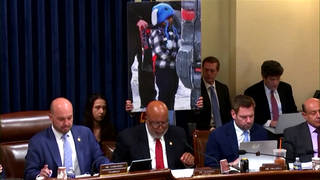
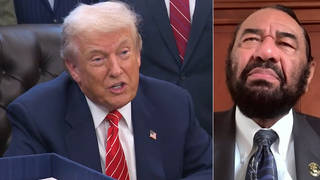
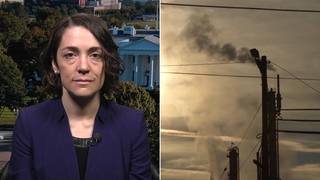
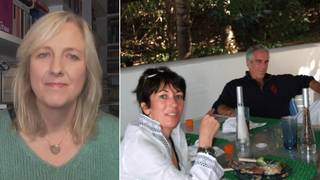





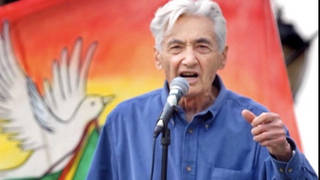

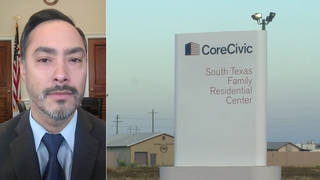
Media Options